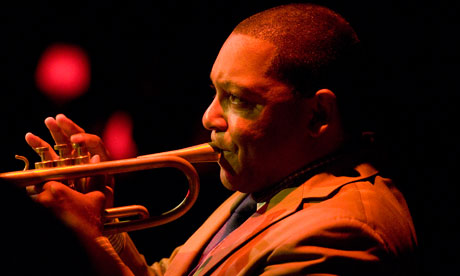
In a consonance of fives, Ronnie Scott's is currently celebrating the fifth birthday of its makeover under Sally Greene's ownership with a five-night season by Wynton Marsalis's quintet. The American trumpet star's particular mix of high skill, stagecraft and devotion to jazz's golden age is a fitting symbol for the 51-year-old Soho club's survival. While economic tempests have raged around it since 2006, Ronnie's has tripled its turnover. Though younger and edgier notions of jazz have fortunately been part of that success story too, a star such as Marsalis is an emblem of a bankable safer bet – time-tested jazz class. As always, he resoundingly delivered on that promise.
The quintet opened its first show with the devious blues Number Eight, a throwback to the trumpeter's 2006 relaunch engagement at the club. Marsalis was soon swerving and skipping through flawless double-time lines, his beautiful tone enhanced by avoidance of the microphone – he swings the bell of the horn around the room as if making an offering to every audience member personally. New piano recruit Jonathan Batiste, an already much-acclaimed 24-year-old from Louisiana, emerged as a quietly ingenious star from his first solo on the opener, with its sly shifts from strutting block-chording to streaming swing and casual juggling of contrasting rhythms in each hand. Batiste made a similarly striking intervention into Marsalis's deft arrangement of April in Paris, first shepherding his boss's flying trumpet break with suggestive trills and prodding offbeats, then chipping out an alternately flinty and spacey Thelonious Monk-like improvisation.
A jauntily street-jazzy handling of Django Reinhardt's Minor Swing was a vehicle for Marsalis's effusive talking-horn technique with the mute, and the ensuing ballad Goodbye was an exquisite exercise in luminous long-note exhalations, soft half-valve slurs and Walter Blanding's patient tenor-sax tone-paintings.
Marsalis can never resist telling audiences how hard the music is (and then defusing the classroom implications with throwaway gags), but nobody needed telling how hard the headlong First Time was, with its tumbling uptempo, note-rammed melody for the trumpet and sax in unison, and then a double-taking turn into the kind of lazily sensuous Cuban dance groove the Buena Vistas could have played. Bassist Carlos Henriquez and drummer Ali Jackson struck sparks in the single set's occasionally becalmed later stages (Marsalis's inventive horn-section writing doesn't altogether get its due in his smallest group), but it was a warmly delivered performance that was eagerly reciprocated by the full house.

